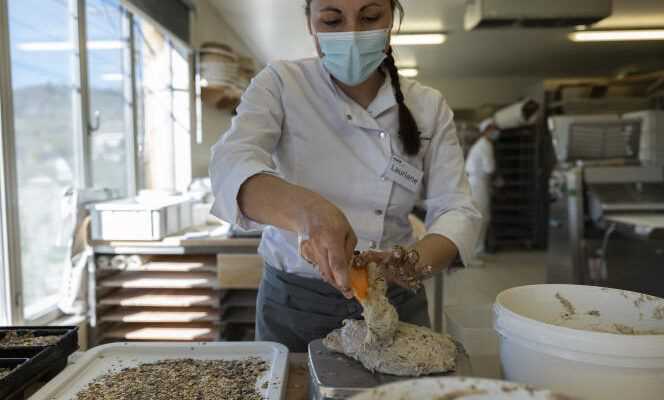They gave it all up and here they are. A merry mess, albeit sticky and dusty. Far from the sanitized open spaces that most have frequented. In the Jabron valley, between Mont Ventoux and Sisteron, their laboratory faces the snow-capped Lure mountain. It smells like rye pie, sesame, cocoa powder … You guessed it: we are with a bunch of retrained at the bakery.
The 11 trainees, aged 28 to 55, signed up for four months of level 4 diploma training (equivalent to the vocational baccalaureate) dedicated to natural sourdough breadmaking. Alternately, they will spend nine weeks here, at the International Bakery School (EIDB), and six weeks in a company. They all have the same objective: to open their own organic establishment, in the city or in the countryside. “We give them a toolbox, they can choose to settle alone in the Creuse or have 80 employees in Hong Kong”, specifies Thomas Teffri-Chambelland, the founder of the school, himself reconverted after a first life as a biology teacher.
Lauriane Delarue, a graduate of Lincoln University in England, dreams of offering her range of sourdough breads and pastries on her own, in Charente-Maritime, near La Rochelle. White cap on her head, she tells her “Mid-thirties crisis”. At the time of the first confinement, in March 2020, she was put on partial unemployment while she was celebrating her 30 years: “I realized that I still had thirty-five years to work and that I was not going to hold out”, says the one who was in charge of affairs in a group of tools for construction companies. A permanent contract, good bonuses and a company car: “On paper, I had everything to be happy”, admits Lauriane. Except that she can no longer bear spending her time on Excel files and that on Sunday evening, she can no longer sleep. “There was no meaning to me, I still lacked the pleasure. I was secretly thinking about baking, but work from 3 in the morning scared me to build a family… ”
“A more human rhythm”
Like most graduates who turn to manual trades, eager for “Concrete” and mostly privileged, it is essential for these new bakers to find a balance between their personal and professional lives. Some will only open at the end of the afternoon to preserve their nights. ” The image of the baker, locked up at night in his cellar, cannot be an ideal. We must get out of this Zola standard, come back to a more human pace ”, underlines Thomas Teffri-Chambelland, who militates for a reconsideration of the social status of the craftsman.
You have 73.86% of this article to read. The rest is for subscribers only.
